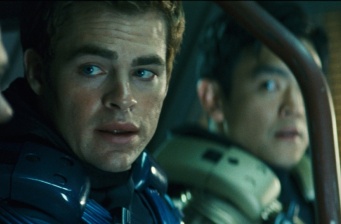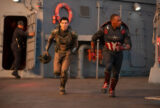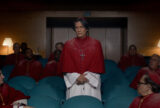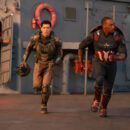04.8.2009 | By Mack Chico |

Empire Magazine has revelaed the first review of the new Star Trek film being released in the U.S on May 8th. Let us know what you think of the review!
REVIEW
According to recently discovered 23rd-century history, James Tiberius Kirk was literally born of battle — the last fight he ever backed away from was the one he was delivered into. In purely Darwinian terms though, Jeffrey Jacob Abrams was forged by a 21st-century crucible far more unforgiving than a field of photon torpedoes: network television — not HBO, television.
Two movies in to what promises to be a storied career and the 42 year-old director has yet to find any gear but fifth. It’s as if his apprenticeship pacifying the ADD generation has inculcated a native fear of flipping. The heart-stopping second act of Abrams’ underrated M:I-III is a real-time mercy dash that would even leave Bourne breathless. For his latest mission impossible, Abrams sustains this improbable pace for even longer: Star Trek — yes, your dad’s Star Trek — moves like a racehorse that’s just been force-fed dilithium crystals.
Advance word that Abrams’ franchise reboot would witness fulfilment of the near-mythical Starfleet Academy project proves misplaced. The director and his Trekkie-credentialed writers, Roberto Orci and Alex Kurtzman, are so impatient to pitch their neophyte crew into full-blown battle that the Academy years are largely covered by a single title card — “Three Years Later”. Phasers permanently set on stun are not much fun, after all.
From the moment ‘Bones’ McCoy comically smuggles an academically suspended Kirk onto Captain Pike’s U.S.S. Enterprise, Star Trek XI hits warp factor IX and, save for an obligatory sojourn with Spock senior, maintains a velocity that would give Scotty night terrors. This is perhaps NCC-1701’s most radical refit yet — for the first time in the franchise, the Enterprise is a genuine thrill-ride.
Not that the crew are just along for the V-necks. Abrams can do character on the run and the plot deftly deals in decent-sized roles for all of the famous seven. Karl Urban’s gruff McCoy and Zachary Quinto’s piercing Spock stand out, and despite internet rumbling, Chris Pine is also absolutely fine. Of course, as you might expect, the acting mostly requires shouting declarative Trekbabble or wedging witticisms between set-pieces, but both Bruce Greenwood’s stoic Captain Pike and Eric Bana’s wounded Nero forage earthier notes amid the SFX sheen.
That Trek weakness for warping plotlines does bring the usual convolutions, but whenever the Vulcan side of your brain is tempted to pose frequently asked questions about time travel, the breakneck pace drags you forward through the movie’s own brisk running time. On the downside, Abrams is not quite able to apply the brakes in time for the third act, which prematurely climaxes before you have time to drink it in. Kirk has a nice Indy moment and the Enterprise does a good impression of the Millennium Falcon in the Battle Of Yavin, but Spock’s dogfight with a drill is unlikely to enter Starfleet legend — what is pointy ears doing flying anything? — and Bana’s Nero deserved at least one villain’s mulligan.
Those hoping for a battle of wits to equal Kirk and Khan — or for hardcore Trekkers, to rival the Balance Of Terror episode that introduced the Romulans — will be left wanting. This is a Sulu-sized miscalculation. The Enterprise is a handsome ship, as evidenced by the hero shot Abrams gives her in the rings of Saturn (let’s call it the screensaver), but she was built for games of Battleship, not Asteroids.
Indeed, where XI ultimately falls short of the very best Trek, or indeed of all great science-fiction since Jules Verne, is in its want of big ideas. As a MacGuffin the movie boasts red matter — like a massive snooker ball, only deadlier — but it doesn’t find enough time to showcase the grey variety.
Very much like its dynamic young cast, this Trek is physical and emotional, sexy and vital even, but it is not cerebral. The movie is not exactly empty-headed; indeed it has some smarts, but it doesn’t live up to the high-mindedness that was part of Gene Roddenberry’s original mission statement.
Where overarching themes can be discerned, they primarily relate to the nature of friendship and teamwork, which is all very well, but it’s a grunt’s eye view of battle. Even a captain would appreciate the importance of battlefield tactics and how they intersect with military strategy and, ultimately, political vision.
For anyone who has endured the longueurs of both the Star Wars prequels and Matrix sequels, the distinct lack of politicking and speechifying will doubtless come as a blessed relief, but in a time when the United States is engaged in two wars, the failure to even acknowledge the issues arising from space imperialism and the Prime Directive is to flinch from battle. Harsher critics may even deem it a dereliction of duty. Season three of the rebooted Battlestar Galactica turned half its cast into Iraqi-style insurgents — and that was on television.
Ultimately, any boldness one can attach to the going here really belongs to the rescue of the Trek franchise from cultural irrelevance. This is a not insignificant achievement. As Abrams has noted himself, making 45 year-old tricorders desirable for the iPhone generation is a hell of a tough gig. Doing this while simultaneously pandering to the doctorates in Klingon is a task of Herculean, nay Sisyphean, proportions.
But Abrams and his crew pull it off. Save for the typically muddy motives of the modern bad guy — oh, for a truly Evil Empire — there is nothing much to confuse the multiplex masses, while there are plenty of in-jokes and visual details for the forum-dwellers to chew over. More to the point, the film is sassy, young and hip in a way the franchise has not been since the ’60s. It’s neither The Hills in space nor fan fiction with a $150 million budget. Kudos is due.
There will, of course, be some disquiet from the faithful, and not just because Kirk’s birth is yucky and his besting of Kobayashi Maru comes off as cocky. Fans of the TV show will note planet-sized deviations from accepted Trek lore. To excuse their creative licence, writers Orci and Kurtzman have Uhura explain that Nero’s time-travelling misdemeanours has fashioned an “alternate reality”. It’s a nifty enough trick often used on the show, but what will really bamboozle the keepers of the canon is that unlike the many episodes that dabbled in fractured timelines, there’s no smallscreen amnesia to put things back in place for next week. The franchise has been permanently shifted to new rails: this is a world where Kirk doesn’t grow up to look like William Shatner. Trekkies had better get used to it. Welcome to the new ’verse.
The fanbase placated and a brand-new generation blooded, there is undoubtedly even better to come. The characters feel thin right now, not just because of the limited range of the new cast, but because ultimately they are characters playing characters, actors imitating icons. Once the new Enterprise crew are established in their own right and the franchise freed of all that expectation, the characters should start to feel properly human again — or at least, half-human.
Verdict
Odd-number curse be gone. The most exhilarating Trek to date marks a new future for Kirk and co. If this can boldly go on to seek out ideas to match its speed and style, a franchise is reborn.




























